Thursday, January 13, 2022
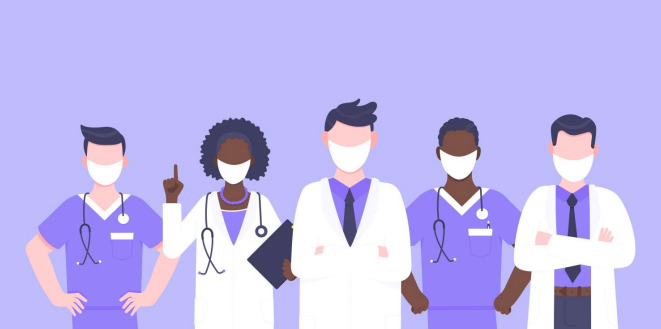
Download Full Report
Welcome to NAVIGATOR – a project designed to better understand the American public’s views on issues of the day and help advocates, elected officials, and other interested parties understand the language, imagery, and messaging needed to make and win key policy arguments.
Key takeaways
Americans are increasingly concerned about the pandemic as Omicron cases rise: nearly half say “the worst is yet to come” in the pandemic, and most at least call it a “major problem.”
Top worries for Americans, however, are less about getting sick or going to the hospital, and more so about how the latest strain is impacting the economy and causing staffing shortages in businesses and schools.
Mitigation policies like vaccine and mask mandates continue to enjoy broad support; messaging on using these mitigation policies to keep the economy going is convincing to most, though comparing Omicron to March 2020 in severity is a weaker lane.
Though Biden has seen a small dip in approval on his handling of the pandemic, he and Democrats are still more trusted to handle the pandemic than the Republican Party and are seen as trying to keep things open, not shutting them down.
As Omicron Cases Continue to Rise, Share Who Say “Worst Is Yet to Come” Hits Highest Level Since Delta Peak
Nearly half of Democrats (49%), a majority of independents (52%), and 46% of Republicans say the “worst is yet to come” in the pandemic.
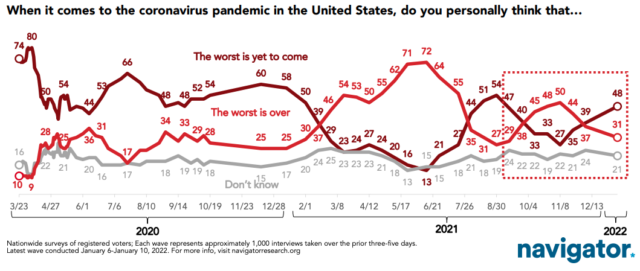
While More Say the “Worst Is Yet To Come” in the Pandemic, There’s Been a Small Dip in the Share Calling It a “Major Crisis”
Among Democrats since November, there has been a 9-point decline in the share who say it is a “major crisis,” while there has been an 11-point increase in the share who call it a “major problem, but not a crisis.”
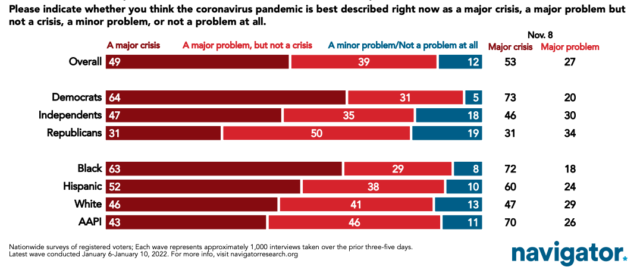
Americans Are Increasingly Concerned About the Spread of Omicron Compared to Early December
There has been a 5-point increase in concerns about the national spread of Omicron (69% to 74%) and a 6-point increase in concerns about local spread (67% to 73%) since December.
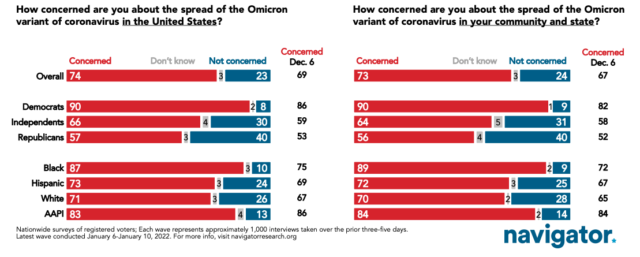
Since Mid-December, Many More Have Gotten Coronavirus Beyond Those Who Have Tested Positive at Official Sites
Almost one in ten (9%) report currently having coronavirus or recently testing positive, but only half (47%) of those respondents report testing at a hospital or official testing site.
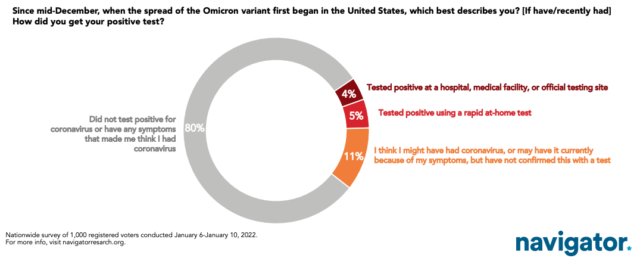
Top Pandemic Worries Are a Possible Recession, Staffing Shortages Disrupting the Economy, and New Variants
For independents and Republicans, top worries are a possible recession and staffing shortages disrupting the economy; for Democrats, new variants and someone close getting coronavirus are the top two worries.
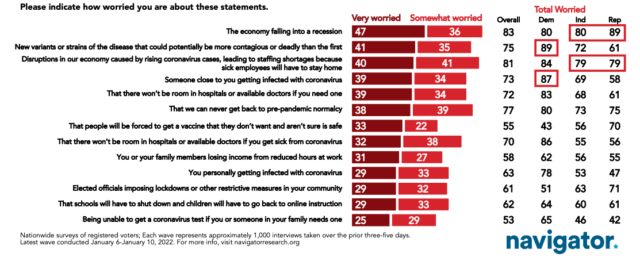
Americans Are More Concerned About People Getting Sick and Staffing Shortages Than Imposing Government Mandates
A majority of independents (56%) find school staffing shortages and potential shutdowns more concerning than government mandates.
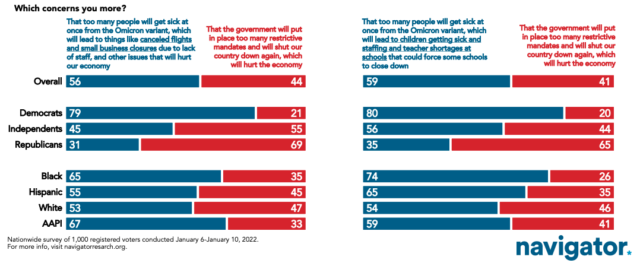
Americans Report Hearing Positives About Biden’s Handling of the Pandemic, Vaccines, and His January 6th Speech
Since last asked in early December, there has been a 6-point drop in the share who report hearing either “mostly negative” or an “equal mix of positive and negative” on Biden (from 67% to 61%).
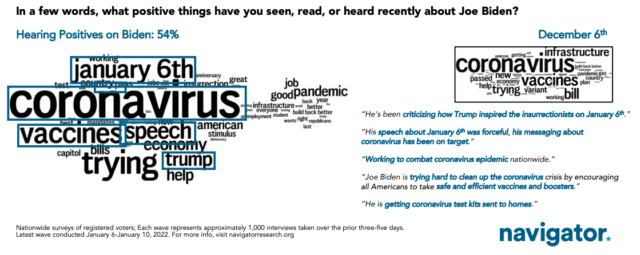
Nearly Seven in Ten Support Mask Mandates Overall, and Four in Five Support Mask Mandates in at Least Some Settings
Among independents, almost two in three support mask mandates broadly (63%) and 75% support mask mandates in at least one situation. Two in three (66%) Republicans also support mask mandates in at least one situation.
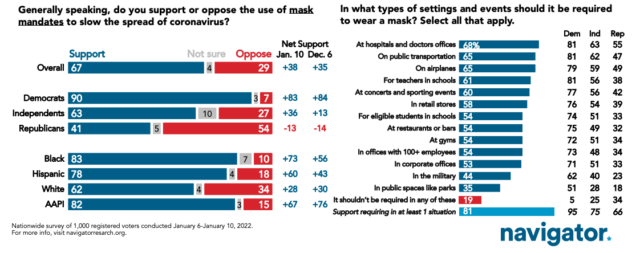
On Vaccine Mandates, Two in Three Support in at Least One Situation and a Majority Support Them Broadly
There has been an 8-point increase in net support for vaccine mandates since December (net +12 to net +20).
Overall, 68% support vaccine mandates in at least one situation, with hospitals (54%) and planes (51%) at the top.
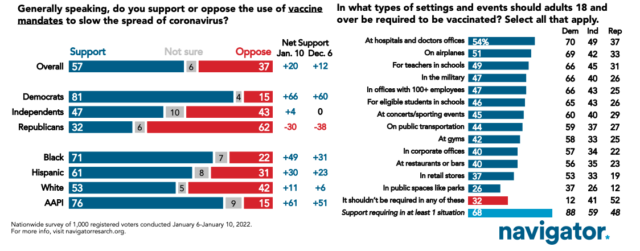
Various Lanes on Tackling Economy and Omicron Benefit Progressives, But March 2020 Comparison Is Less Effective
While roughly two in five find messages focused on getting the pandemic under control first to avoid disrupting the economy “very convincing,” a message comparing Omicron to March 2020 is “very convincing” to only 28%.
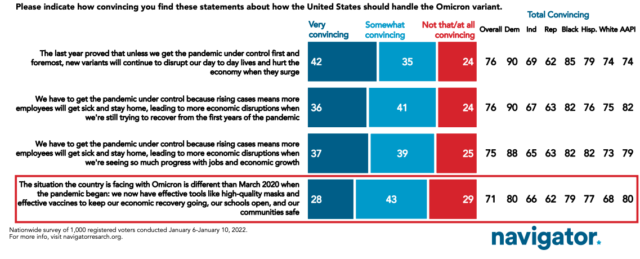
Majorities Say the Best Way to Keep the Economy Open Is to Use Mask and Vaccine Mandates to Slow The Spread
A majority of independents (54%) and nearly two in five Republicans (37%) agree more that mask and vaccine requirements are the best way to keep the economy open rather than returning to life as normal pre-pandemic.
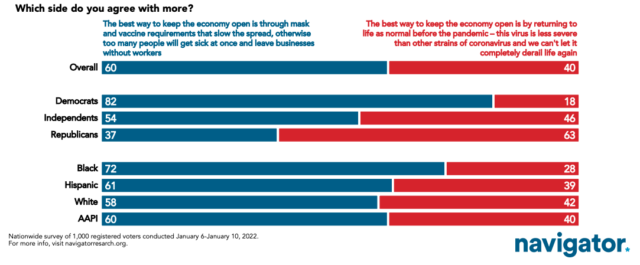
Biden’s Pandemic Ratings Have Dropped While He Sees Minor Improvement Since December Overall and on Economy
Biden’s approval rating on the pandemic has dropped a net 3 points since early December (from net +5 to net +2), while he has seen modest improvements on his approval overall (from net -7 to net -4) and on the economy (from net -14 to net -9).
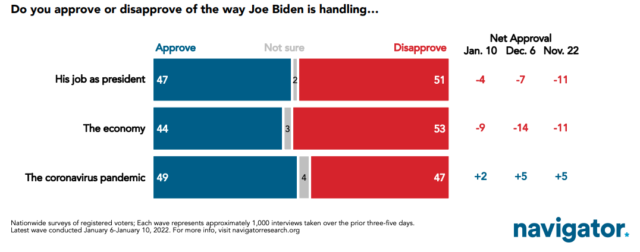
Americans Trust Biden and Democrats Over Republicans to Handle Pandemic-Related Issues
Independents trust Biden and Democrats more to “ensure enough people are vaccinated against coronavirus” by 23 points, to “listen to scientists” by 19 points, and to “combat the coronavirus pandemic” by 12 points.
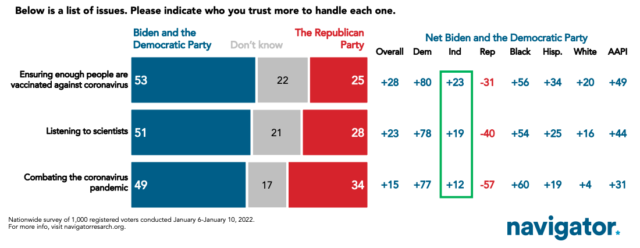
Many Republicans Say Biden Is “Overreacting”; Plurality of Americans Say Republicans Are “Not Doing Enough”
Among independents, while 37% say Republicans in Congress are not doing enough, just 26% say the same of Biden and his administration.
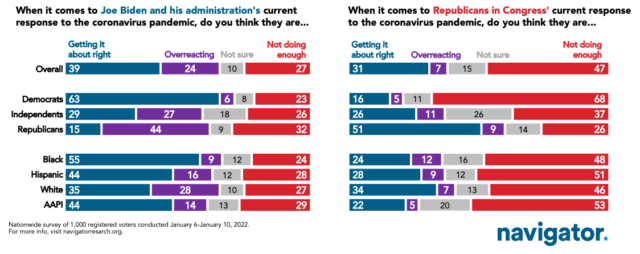
Majorities See Biden and Democratic Elected Officials Trying to Keep Things Open, Not Shut Them Down
Pluralities of both independents (44%) and Republicans (40%) say Biden and Democrats are trying to keep things open while promoting things like mask and vaccine mandates.
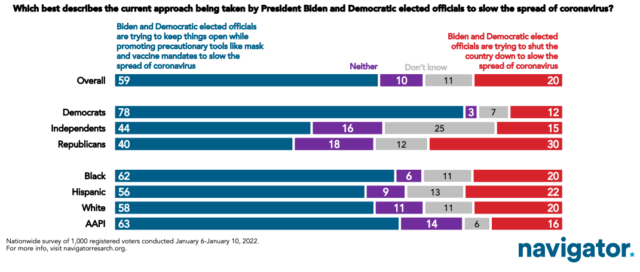
A Range of Messages Work To Rebut Republican Criticisms Democrats Only Want to Control American Lives on Pandemic
Whether the progressive response focuses on following public health experts, not letting the country shut down again, or keeping people safe and healthy, each is more effective by double digits than a Republican critique.
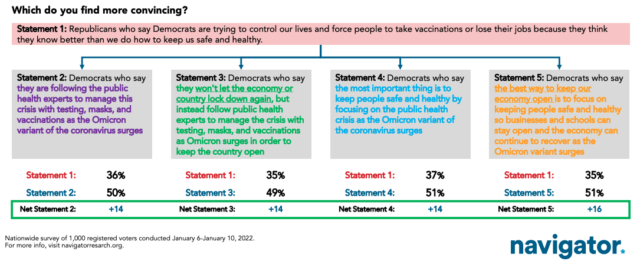
About The Study
This release features findings from national online surveys of 1,000 registered voters conducted January 6-10, 2022. Additional interviews were conducted among 101 Hispanic voters, 100 African American voters, 101 independents without a partisan lean, and 79 Asian American and Pacific Islander voters.
Welcome to NAVIGATOR – a project designed to better understand the American public’s views on issues of the day and help advocates, elected officials, and other interested parties understand the language, imagery, and messaging needed to make and win key policy arguments.
Key takeaways
Americans are increasingly concerned about the pandemic as Omicron cases rise: nearly half say “the worst is yet to come” in the pandemic, and most at least call it a “major problem.”
Top worries for Americans, however, are less about getting sick or going to the hospital, and more so about how the latest strain is impacting the economy and causing staffing shortages in businesses and schools.
Mitigation policies like vaccine and mask mandates continue to enjoy broad support; messaging on using these mitigation policies to keep the economy going is convincing to most, though comparing Omicron to March 2020 in severity is a weaker lane.
Though Biden has seen a small dip in approval on his handling of the pandemic, he and Democrats are still more trusted to handle the pandemic than the Republican Party and are seen as trying to keep things open, not shutting them down.
As Omicron Cases Continue to Rise, Share Who Say “Worst Is Yet to Come” Hits Highest Level Since Delta Peak
Nearly half of Democrats (49%), a majority of independents (52%), and 46% of Republicans say the “worst is yet to come” in the pandemic.

While More Say the “Worst Is Yet To Come” in the Pandemic, There’s Been a Small Dip in the Share Calling It a “Major Crisis”
Among Democrats since November, there has been a 9-point decline in the share who say it is a “major crisis,” while there has been an 11-point increase in the share who call it a “major problem, but not a crisis.”

Americans Are Increasingly Concerned About the Spread of Omicron Compared to Early December
There has been a 5-point increase in concerns about the national spread of Omicron (69% to 74%) and a 6-point increase in concerns about local spread (67% to 73%) since December.

Since Mid-December, Many More Have Gotten Coronavirus Beyond Those Who Have Tested Positive at Official Sites
Almost one in ten (9%) report currently having coronavirus or recently testing positive, but only half (47%) of those respondents report testing at a hospital or official testing site.

Top Pandemic Worries Are a Possible Recession, Staffing Shortages Disrupting the Economy, and New Variants
For independents and Republicans, top worries are a possible recession and staffing shortages disrupting the economy; for Democrats, new variants and someone close getting coronavirus are the top two worries.

Americans Are More Concerned About People Getting Sick and Staffing Shortages Than Imposing Government Mandates
A majority of independents (56%) find school staffing shortages and potential shutdowns more concerning than government mandates.

Americans Report Hearing Positives About Biden’s Handling of the Pandemic, Vaccines, and His January 6th Speech
Since last asked in early December, there has been a 6-point drop in the share who report hearing either “mostly negative” or an “equal mix of positive and negative” on Biden (from 67% to 61%).

Nearly Seven in Ten Support Mask Mandates Overall, and Four in Five Support Mask Mandates in at Least Some Settings
Among independents, almost two in three support mask mandates broadly (63%) and 75% support mask mandates in at least one situation. Two in three (66%) Republicans also support mask mandates in at least one situation.

On Vaccine Mandates, Two in Three Support in at Least One Situation and a Majority Support Them Broadly
There has been an 8-point increase in net support for vaccine mandates since December (net +12 to net +20).
Overall, 68% support vaccine mandates in at least one situation, with hospitals (54%) and planes (51%) at the top.

Various Lanes on Tackling Economy and Omicron Benefit Progressives, But March 2020 Comparison Is Less Effective
While roughly two in five find messages focused on getting the pandemic under control first to avoid disrupting the economy “very convincing,” a message comparing Omicron to March 2020 is “very convincing” to only 28%.

Majorities Say the Best Way to Keep the Economy Open Is to Use Mask and Vaccine Mandates to Slow The Spread
A majority of independents (54%) and nearly two in five Republicans (37%) agree more that mask and vaccine requirements are the best way to keep the economy open rather than returning to life as normal pre-pandemic.

Biden’s Pandemic Ratings Have Dropped While He Sees Minor Improvement Since December Overall and on Economy
Biden’s approval rating on the pandemic has dropped a net 3 points since early December (from net +5 to net +2), while he has seen modest improvements on his approval overall (from net -7 to net -4) and on the economy (from net -14 to net -9).

Americans Trust Biden and Democrats Over Republicans to Handle Pandemic-Related Issues
Independents trust Biden and Democrats more to “ensure enough people are vaccinated against coronavirus” by 23 points, to “listen to scientists” by 19 points, and to “combat the coronavirus pandemic” by 12 points.

Many Republicans Say Biden Is “Overreacting”; Plurality of Americans Say Republicans Are “Not Doing Enough”
Among independents, while 37% say Republicans in Congress are not doing enough, just 26% say the same of Biden and his administration.

Majorities See Biden and Democratic Elected Officials Trying to Keep Things Open, Not Shut Them Down
Pluralities of both independents (44%) and Republicans (40%) say Biden and Democrats are trying to keep things open while promoting things like mask and vaccine mandates.

A Range of Messages Work To Rebut Republican Criticisms Democrats Only Want to Control American Lives on Pandemic
Whether the progressive response focuses on following public health experts, not letting the country shut down again, or keeping people safe and healthy, each is more effective by double digits than a Republican critique.

About The Study
This release features findings from national online surveys of 1,000 registered voters conducted January 6-10, 2022. Additional interviews were conducted among 101 Hispanic voters, 100 African American voters, 101 independents without a partisan lean, and 79 Asian American and Pacific Islander voters.
No comments:
Post a Comment